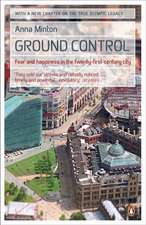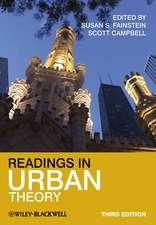Business Improvement Districts in the United States: Private Government and Public Consequences
Autor Abraham Ungeren Limba Engleză Hardback – 21 noi 2016
This book examines how privatization has transformed cities, particularly through the role of Business Improvement Districts (BIDs) in the revitalization of America’s downtown. These public-private partnerships between property owners and municipal government have developed retail strips across the United States into lifestyle and commercial hubs. BIDs are non-profit community organizations with the public power to tax and spend on services in their districts, but they are unelected bodies often operating in the shadows of local government. They work as agents of economic development, but are they democratic? What can we learn from BIDs about the accountability of public-private partnerships, and how they impact our lives as citizens? Unger explores these questions of local democracy and urban political economy in this age of rampant privatization and the reinvention of neighborhoods.
| Toate formatele și edițiile | Preț | Express |
|---|---|---|
| Paperback (1) | 721.51 lei 6-8 săpt. | |
| Springer International Publishing – 22 apr 2018 | 721.51 lei 6-8 săpt. | |
| Hardback (1) | 725.75 lei 6-8 săpt. | |
| Springer International Publishing – 21 noi 2016 | 725.75 lei 6-8 săpt. |
Preț: 725.75 lei
Preț vechi: 885.06 lei
-18% Nou
Puncte Express: 1089
Preț estimativ în valută:
138.92€ • 150.94$ • 116.77£
138.92€ • 150.94$ • 116.77£
Carte tipărită la comandă
Livrare economică 21 aprilie-05 mai
Preluare comenzi: 021 569.72.76
Specificații
ISBN-13: 9783319322933
ISBN-10: 3319322931
Pagini: 193
Ilustrații: XIII, 206 p.
Dimensiuni: 148 x 210 x 22 mm
Greutate: 0.39 kg
Ediția:1st ed. 2017
Editura: Springer International Publishing
Colecția Palgrave Macmillan
Locul publicării:Cham, Switzerland
ISBN-10: 3319322931
Pagini: 193
Ilustrații: XIII, 206 p.
Dimensiuni: 148 x 210 x 22 mm
Greutate: 0.39 kg
Ediția:1st ed. 2017
Editura: Springer International Publishing
Colecția Palgrave Macmillan
Locul publicării:Cham, Switzerland
Cuprins
1. Privatization in the Neighborhood .- 2. The Structure of Bids: Public-Private Hybrids .- 3. The Real Lives of BIDs .- 4. How BIDs Behave: Publicness and Privateness in BID Organizational Life .- 5. DSBS and BIDs: Advocacy, Not Oversight .- 6. Epilogue.
Recenzii
“Abraham Unger provides readers with a new lens for understanding the inner workings of Business Improvement Districts (BIDs). … The author’s in-depth analysis and methodological approach to reviewing New York BIDs will serve countless practitioners and academics studying internal complexities of BIDs and the role of government and private sector and may ultimately lead to improved levels of accountability and transparency in BIDs and improved models of governance in PPPs.” (Haris Alibašić, Public Administration Review, Vol.78 (1), 2018)
Notă biografică
Abraham Unger is Assistant Professor of Government and Director of Urban Programs at Wagner College, USA, and Senior Research Fellow at the Carey Institute for Government Reform. Unger is a member of the Staten Island Borough President’s Strategic Policy Advisory Committee.
Textul de pe ultima copertă
This book examines how privatization has transformed cities, particularly through the role of Business Improvement Districts (BIDs) in the revitalization of America’s downtown. These public-private partnerships between property owners and municipal government have developed retail strips across the United States into lifestyle and commercial hubs. BIDs are non-profit community organizations with the public power to tax and spend on services in their districts, but they are unelected bodies often operating in the shadows of local government. They work as agents of economic development, but are they democratic? What can we learn from BIDs about the accountability of public-private partnerships, and how they impact our lives as citizens? Unger explores these questions of local democracy and urban political economy in this age of rampant privatization and the reinvention of neighborhoods.
Caracteristici
One of the few book-length studies solely devoted to public-private partnerships involved in the remaking and gentrification of urban space Explores BID practices as they relate to democratic theory and debates about the privatization of government services Presents a detailed case study of BIDs and public-private partnerships in New York City













